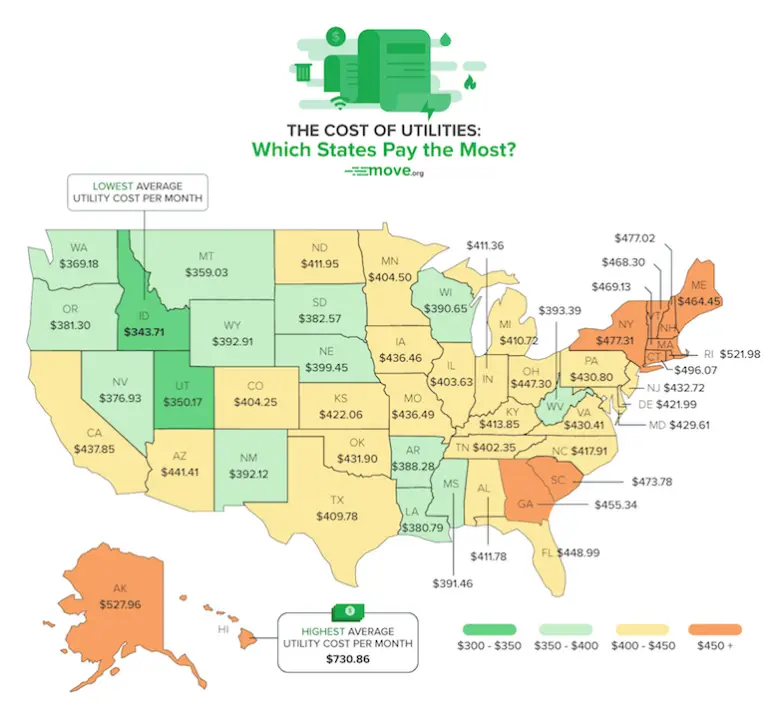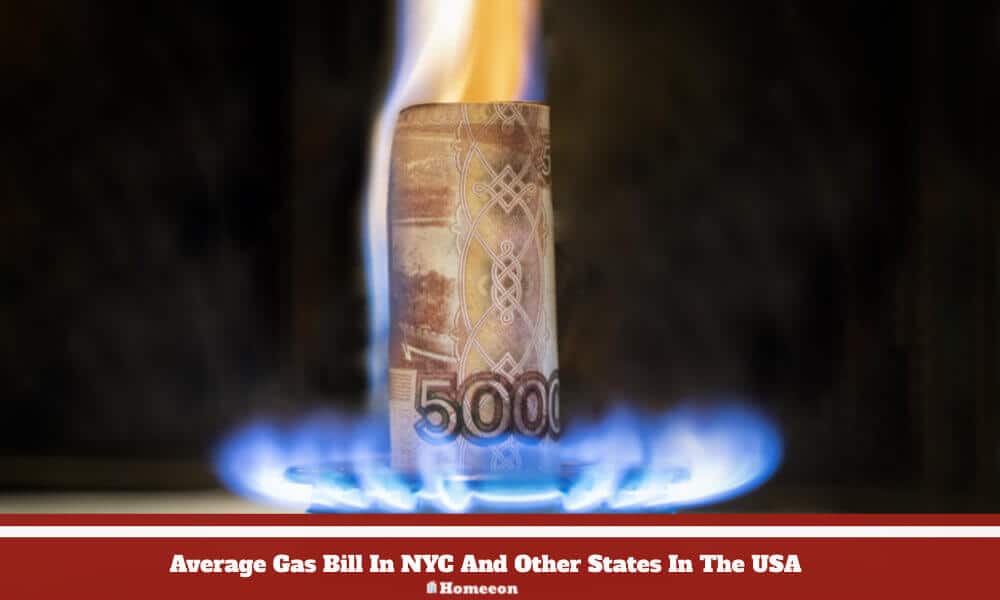Last Updated on July 30, 2023 By Emma W. Thomas
The average gas bill in NYC ranges from $100 – $120 per month, but this depends on the time of the year and the usage. Other states have varying averages depending on where they are. Whether your appliances are fuelled by gas or not and how energy-efficient they are will also impact the bills.
What’s the Cost of the Average Gas Bill in NYC?
Determining the average cost of a gas bill in New York City can vary based on several factors, such as the size of the home, energy efficiency, and personal usage habits. However, there are certain averages one can consider:
- Residential gas usage: Residential utilities in New York City have an average price that fluctuates depending on the season. Natural gas costs on average between $100 – $150 per month in the winter season, decreasing to an average of $30 – $40 in the summer.
- Commercial gas usage: For commercial establishments, the gas bill is typically higher due to larger usage and square footage. The average cost can range between $200 – $400 per month.
- Seasonal Variations: The cost of gas in NYC can significantly vary between winter and summer months. Space heating during cold months often leads to higher consumption.
- Energy Efficiency: Homes or businesses with high standards of insulation, efficient appliances and energy-saving habits may experience lower gas bills.
Here is a simple breakdown of the average gas bill in NYC:
| Property Type | Average Gas Bill |
|---|---|
| Residential | $30 – $150 |
| Commercial | $200 – $400 |
What Are The Average Natural Gas Prices By The State?

Knowing how much you spend on natural gas can help you compare your consumption with your neighbors. People living in colder states spend more on gas than others. As per the statistics from the American Gas Association, the following were the average annual bills in 2017 for some States;
State | Average Annual Bill | State | Average Annual Bill |
Alabama | $547 | Alaska | $1,609 |
Arizona | $419 | Arkansas | $602 |
Colorado | $545 | Connecticut | $1,184 |
Florida | $399 | Delaware | $739 |
Georgia | $583 | Hawaii | $770 |
| Idaho Indiana | $563 $635 | Illinois Kansas | $810 $687 |
Mississippi | $470 | Missouri | $738 |
Montana | $595 | Michigan | $759 |
Maryland | $809 | Massachusetts | $1,068 |
Nebraska | $577 | Nevada | $422 |
What Are The Factors That Influence The Average Gas Bill?
Besides the state one lives in, other factors influence the gas bill, including;
- Your home’s age- Unlike newer homes that need less energy, most older homes are not well insulated, making them require more energy to cool down in summer and warm up during winter.
- How big or small a home is – bigger homes will consume more energy since there are many appliances that use electricity and gas compared to smaller houses.
- The number of occupants in your home – If you have many people living in your home, it means more energy consumption, resulting in higher gas and electricity bills.
- Your appliances – If you have several old appliances in your home, the bill is likely to go up. But, if you are using modern appliances like stoves and cookers that are energy-efficient, your gas price may not be so high.
- The general cost of natural gas – sometimes gas prices may vary, which will impact your bill.
Why You Could Be Having Higher Gas Bills Than Necessary
Sometimes your gas bill could be higher than the average in your area due to the following reasons;
Your Appliances Are Not Energy Efficient
Most modern appliances are energy-efficient, making them use less gas. Conversely, those gadgets that were manufactured a few years ago may not be as efficient, leading to higher bills
Older Homes
If you reside in an old building with no insulation, especially those with high ceilings and sizeable single window panes, your gas charges could be increased. Such structures could lose a lot of heat, leading to more energy consumption to warm them up.
Leaking Appliances
While you may notice a gas leak through smell, it may not always be the case, especially with appliances installed outdoors. Equipment such as water heaters may leak without the user’s knowledge, leading to gas wastage, which translates to high gas bills.
If you suspect a gas leakage, be sure to call the gas company to inspect your gadgets and fix any problem. Gas companies will not charge for responding to reported leaks, but you can pay a small fee for them to relight your appliances.
Weather
During cold weather, heaters will work harder to warm up your space. You may also be tempted to turn up the thermostat, which will lead to more gas energy consumption. If your water heater frequently runs on the highest setting to keep the water hot, it will translate to higher bills.
How Can I Reduce My Monthly Gas Bill?
You can make some adjustments to help reduce your monthly gas bills. Some of these steps include;
Improving Your Home’s Energy Efficiency And Insulation
You can upgrade your windows, cooling, and heating system, as well as add more insulation to your home. While it may require you to use cash, it will help you save on energy bills in the long run.
Replace Any Old Gadgets With New Ones
Since modern appliances are energy-efficient, you may consider replacing old gadgets with new ones. Your stoves, water heaters, washing machines, and dishwashers need to be modern hence save on bills.
Raise Your Thermostat’s Temperature In Summer And Lower It During Winter
One of the main contributors to high gas bills is the heating and cooling of the home. You can reduce this by raising your thermostat during summer and lowering the same during winter. Adjusting your thermostat 2-3 degrees as need be will go a long way to controlling your gas usage.
Avoid Cooling Or Heating Areas Of Your Home You Rarely Use
Most heating systems have settings customized for different regions of the house, which can help avoid heating areas not being used. You can also set your timer such that the home will not be heated when no one is there.
Proper Usage Of Ceiling Fans
Your ceiling fans should run at a slower speed and in a clockwise direction during cold weather. Doing this will help to recirculate the warm air, thus leading to less gas usage.
Turning Down The Water Heater
Some water heaters may have settings as high as 140 degrees which may not be necessary. Turning down the temperatures can help save some cash on your gas bills, but ensure that it allows for comfortable showers. The heater should also give warm water for your dishes and other uses.
Some Terms Used In Gas Bills
It is necessary to know some of the terms used with gas bills to help understand more. Some of these terms include;
Centum Cubic Feet (CCF)
CCF is a unit used to measure gas used in the billing of water and natural gas delivered to homes. One Centum Cubic Feet are equal to 1.025 Therms of heat from burning natural gas.
Therms
A therm is a unit of measurement for calculating the amount of energy used to determine the monthly bill for natural gas. One therm is equal to 100,000 BTUs.
BTUs
A BTU (British Thermal Unit) is an energy measuring unit used to calculate the amount of energy that is required to increase the temperature of one pound of water to 10F.
Price Per Therm
Price per therm is the amount that one pays (per therm) as per your contract. This rate may be different depending on supply, time of the year, or other cost factors if one is on a variable rate plan.
What Is A Gas Charge?
A customer gas charge refers to a fixed amount of money that one pays for the reading of the meter, provision of customer services, and processing of monthly bills. These charges remain constant for each consumer regardless of the amount of gas consumed.
Conclusion
Knowing the average gas bill in different states is helpful if you plan to move or buy a home. But, it is necessary to consider the factors that impact your gas consumption, such as whether your appliances are gas-fueled or not, your home’s age, and whether you have energy-efficient gadgets.
It is also crucial to know how to keep your gas consumption low by upgrading your appliances and maintaining your devices and heating systems. You may also have to invest in proper insulation of your house and ensure no blockages to ensure a smooth flow of warm air. Lowering your thermostat by a few degrees will also help to keep your bills in check.
References:
https://www.benefyd.com/average-gas-bill/
https://www.inspirecleanenergy.com/blog/sustainable-living/average-gas-bill
Emma is a graduate of Domestic Science or Family and Consumer Sciences (Home Economics) from the University of Wisconsin. She has 7 years of experience Working with the strategic section of BestBuy and now writing full-time for Homeeon.
From Managing the Home, Interiors, Cleaning, and Exteriors to Gardening and everything about Making A Home Liveable – is her passion and this Homeeon is the result of this.
Emma loves decorating her home with the best stuff found online. She cares about quality over anything and writes reviews about them here in Homeeon. Get in touch with her over Pinterest.
Keep reading her blogs.
